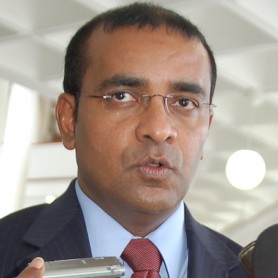In the wake of vociferous public criticism of a government directive to the Guyana Elections Commission (GECOM) on the placement of advertisements, President Bharrat Jagdeo yesterday clarified that voter education will not be affected by this instruction.
Head of the Presidential Secretariat Dr Roger Luncheon had written to GECOM on September 16 specifying that advertisements/notices “with the exception of those associated with discharging GECOM’s constitutional and legal responsibilities (Orders, Notices, Acts and Amendments)” must be submitted to the Government Information Agency for placement on the recently launched e-procure website. His exceptions did not refer to voter education implying that GECOM was being directed against the placement of such ads in the print and broadcast media.

At a press conference at the Office of the President yesterday, Jagdeo said that the order will not affect voters’ education. “We are clear and his directive was clear. For anything to do with voters’ education, notification of people about polling stations and registration centres etc…these issues were not covered by the directives. There is no issue about GECOM being unable to reach the public. We hope that they would not just use the newspaper but television and as many media as possible to reach people,” Jagdeo said.
The President yesterday also sought to shift attention from the directive to channel ads via the procurement site to alleged single-sourcing by GECOM at the 2006 election. The President said GECOM will have access to all the resources needed to conduct next year’s general elections but the body will face scrutiny over how it spends money procuring materials and services.
Jagdeo said that while the Commission is an independent agency, the body has to adhere to the country’s procurement laws. “We don’t determine what decision GECOM makes in relation to the elections, that is done by the Commission. We are not interfering with their advertisements for voters’ education but clearly, you better believe, we are going to watch how they spend taxpayers’ money in procuring materials and services,” the Head of State said.
While promising that “GECOM will have all the resources they need in carrying out elections,” Jagdeo said that the body has “to comply with this country’s procurement laws”.
Jagdeo said that in the lead up to the 2006 elections, “a blind eye” was turned to some of the procurement practices by GECOM because of the urgency to have those elections come off. There was a lot of single-sourcing of materials for these elections, Jagdeo said. He stressed that this will not be allowed to occur again for next year’s election. “We have time now. We have time where you can go through all the processes,” he said.
The President stated that the reason why several persons who have supplied GECOM with materials have not been paid was because there was no proper tender process. He said that over $100 million in materials were supplied to GECOM without any trace of a tender. Jagdeo said if GECOM wanted to do this, they simply had to seek a waiver from the National Procurement and Tender Administration Board (NPTAB). He said that he did not want to make it seem that GECOM is abusing finances more than any other government agency. Several media houses are owed millions of dollars because the government has not released money to GECOM for advertisements placed during the period when preparations were being made for local government. Many of these ads related to statutory notices and voter education.
The Head of State emphasized that when it comes to procuring materials and services a certain procedure should be followed. “Where it concerns procurement of materials, goods and services for GECOM itself, they have to use this process…this is public money, it’s not GECOM’s money owned by the Commission,” he said. He said that the body has to ensure that in using public funds, it follows the approved procedure.
Earlier this week, Dr Luncheon said that his advertisement directive to GECOM had been misconstrued by “wicked people” but promised to respond promptly to any formally documented concerns sent to him by the body.
GECOM, during a statutory meeting on Tuesday, decided to seek clarification from OP after some Commissioners admitted concerns about the implications of the directive as well as the financial control that government wields.
According to Luncheon, he wrote GECOM identifying “the content of public business of the commission that should be provided to the e-procurement website” adding that “he went further to identify what should be excluded.” Luncheon said that there was no way his instructions could be misconstrued. Critics have said that Luncheon had no authority to instruct GECOM on any matter related to its advertising and that GECOM ads would generally be unsuited for the website. Luncheon’s directive to advertise on the government procurement site comes in the wake of a much pilloried move by the government to remove state ads from private newspapers while allowing them in the state-owned Guyana Chronicle and on the procurement website.
The current controversy has also raided longstanding concerns about the financial independence of GECOM.





